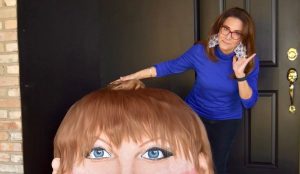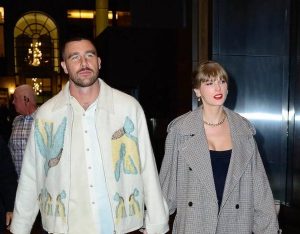The high school bands played, the costumed marching groups danced and float riders threw Moon Pies and beads to the thousands of people who turned out Saturday for New Orleans‘ first big parade since the onslaught of the coronavirus pandemic put the brakes on the city’s signature brand of frivolity.
“It’s better than Christmas,” said Lacey Sanders, who is a member of the Pussyfooters marching club. “I have been waiting for this since April of 2020.”
After over a year where the coronavirus largely put an end to parades, the streets were lined with thousands of residents and tourists who came to watch the Krewe of Boo parade — the first float parade since Mardi Gras of 2020.
Krewe of Boo is a Halloween-themed parade that stretches from the city’s Marigny neighborhood, through the French Quarter and into the Warehouse District. Riders on the floats dress up in Halloween-themed outfits and throw ghoulish and fun trinkets and beads to crowds that pack the streets.
Crowds in sequined or glittery costumes lined the streets. Parents held costumed children on their shoulders. Members of the Rolling Elvi — an Elvis tribute group that rides scooters — took photos with each other. Students from the Lafayette Academy marching band warmed up while girls in a dance troupe practiced their moves.
All would have been common sites during a regular year, but many were cognizant of how long it’s been since the city has seen such an event.
“This is one of the best feelings in a very long time. It’s so lovely,” said Jordan Philebar, a New Orleans resident who was dressed as Wednesday Addams from “The Addams Family” as she rode a float along with four members of her family. “It’s lovely to feel slightly normal again.”
Mardi Gras 2020 was largely credited with contributing to the city becoming an early hot spot for the coronavirus. As the extent and seriousness of the pandemic became apparent, parades and music festivals were canceled.
If the city can pull off the Halloween-themed Krewe of Boo parade safely, without a resulting uptick in COVID-19 infections, it will bolster Mayor LaToya Cantrell’s tentative plans toward bringing back the lavish Mardi Gras processions that fill city streets during the annual pre-Lenten celebration.
“This is a step towards the return of Mardi Gras next spring,” Cantrell said in a Twitter post after announcing in September that the Krewe of Boo parade could proceed. “What happens next depends on what we do right now!!”
On Friday, the mayor said unless there is a “dramatic turn for the worse in our COVID numbers” that Mardi Gras would go forward next year — her strongest comments yet that the massive parades that accompany the yearly celebration would roll again.
New Orleans resident Melanie Smith walked with her granddaughter along Elysian Fields Avenue on Saturday, taking photos of especially good costumes, and participating in something she hadn’t been able to do for over a year.
“We miss it. Us locals, we miss it very much, and we’re just glad to be back,” she said. She said she hoped that with the city’s vaccination numbers continuing to rise the parade wouldn’t result in more coronavirus cases.
As part of Saturday’s safety measures for Krewe of Boo, riders and marching group members had to be vaccinated, or show proof of a negative COVID-19 test.
Also, health officials were out conducting a study during the parade to better understand coronavirus spread in large gatherings. About 40 health employees and volunteers were slated to be at the parade route to assist people in taking the survey and handing out goody-bags to those who take part. In keeping with the Halloween theme, the 40 dressed up as Dr. Anthony Fauci, the White House adviser and face of the federal pandemic response.
Krewe of Boo was scrapped last year and this year’s Mardi Gras was a subdued affair without parades and a largely vacant French Quarter. As vaccinations became more widespread and infections dropped, the city began loosening restrictions that had limited capacity at restaurants or music venues. In one of the last stages of loosening restrictions, officials announced in May that they would start to accept applications for parades and the smaller processions called second-line parades.
The rise of the delta variant, which filled hospitals across the state over the summer, called into question the viability of parades. But in September, Cantrell announced Krewe of Boo would be allowed to parade. She credited work residents had done to slow the delta variant’s spread.
New Orleans resident Stephen Hawkins watched the parade with his family although as a longtime member of the Krewe de Lune, he knows what its like to parade as well. He said the krewe’s dancers practiced throughout the pandemic — outside and socially distanced — but with no one to perform for. Now their time was here.
He said everyone in their krewe was vaccinated but that it’s impossible to say the same for the throngs of people crowded along the parade route. He said he hoped Saturday would lay the groundwork for Mardi Gras next year.
“We’re looking forward to Mardi Gras 2022. This is the dry run,” he said.






